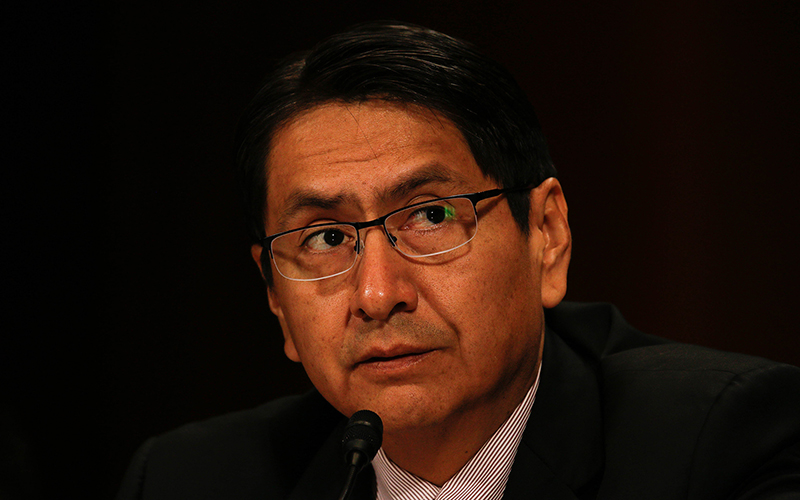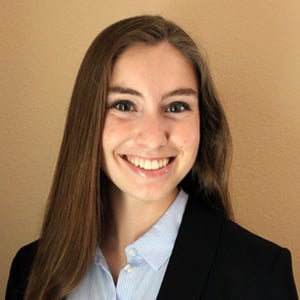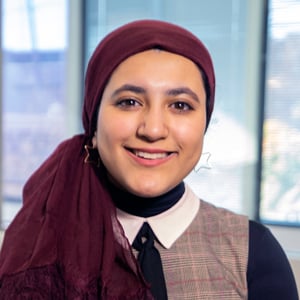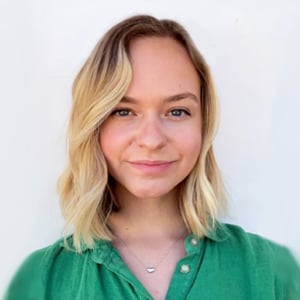
Navajo Nation President Jonathan Nez, shown in a 2018 file photo, said the curfews and lockdowns imposed by the tribal government to stem the spread of COVID-19 are working, but that this is not the time to ease those restrictions. (File photo by Bryan Pietsch/Cronkite News)
PHOENIX – The number of new COVID-19 cases on the Navajo Nation is on a downward trend, but tribal leaders said Tuesday that does not mean they are ready to ease up on health restrictions.
Navajo Nation President Jonathan Nez said in a Facebook live town hall that the tribe will continue its 57-hour weekend lockdown for the next three weeks, meaning most businesses will be closed, people will be encouraged to stay home and visitors will be discouraged. Closure of tribal government offices will also continue.
“What we’re showing you here is that now is not the time to travel. I know it’s summer – we want to travel,” Nez said. “We’ve been sitting in our homes for over three months now, but now is not the time.”
It comes one day after Gov. Doug Ducey was forced to reimpose restrictions on businesses and gatherings in Arizona as the surging number of new cases, hospitalizations and deaths have made the state a national hot spot for the disease.
By comparison, the number of cases on the Navajo Nation have been trending down for most of the past two weeks, Nez said. Except for Saturday, when there were 121 new cases, the Navajo have seen fewer than 100 new cases a day over those two weeks, with one day falling to just 27 positive cases.
Despite the decreases, Nez said the numbers themselves are “still a concern” and that people need to continue practicing social distancing, wearing masks, and limiting travel.
“It shows that the curfews and the lockdowns work. It keeps most of our people at home,” Nez said. “Of course there are some who disobey and those of you who disobey, you know who you are. But you are also putting the lives of our Navajo people at stake.”
Navajo Nation Vice President Myron Lizer signed the executive order in Tuesday’s town hall to extend the closure of government offices and the weekend lockdowns. He said that continued diligence by tribe members, combined with the $714 million the Navajo Nation has received in federal coronavirus relief funding, will let the nation prepare for what is next.
“Never before has our nation been in the position to aid and enhance the health, education, economic development, among others, and expand our infrastructure for future ability to fight this pandemic and the next potential pandemic, whatever that may look like,” Lizer said.
He said the nation is “all in this together,” as he signed the order.
“As the rest of the country advances its fight against COVID-19, our nation’s fight is no different. We’ve always said stay home, stay safe, save lives,” Lizer said. “Nothing has changed. We’ve done that by and large. We need to keep on keeping on.”
As of Tuesday, June 30, the Arizona Department of Health Services reported 4,682 cases of COVID-19 in the state. But those numbers were skewed by the fact that technical problems led to many of Monday’s cases – when just 625 cases were reported – to be included in Tuesdays’ results, according to ADHS Director Dr. Cara Christ.
The department also reported 44 deaths in the state Tuesday. It said 701,834 tests for COVID-19 have been completed in public and private labs in Arizona, and 9.9% of tests have come back positive for the virus that causes the disease.
Everybody out of the pool?
In response to the surging numbers, Ducey on Monday issued an executive order requiring a 30-day shutdown of bars, gyms, waterparks and movie theaters and river tubing.
The executive order also closed all waterparks and allowed for private pools to stay open if signage encouraging social distancing is posted at the site.
But Ann Porter, communications supervisor for Scottsdale Parks and Recreation, said the executive order leaves unanswered questions and wiggle room for city officials to decide how to continue.
Scottsdale, like other cities with public pools, had opened its four pools for lap swim and lessons in groups smaller than 10 beginning on June 22. But following the executive order, all pools in Scottsdale were closed Tuesday so officials can “reaffirm and feel confident we can adhere to all the things outlined in the executive order,” Porter said.
Scottsdale Parks and Recreation announced Tuesday that swim lessons, recreational programs and lap swim would resume Wednesday as previously scheduled.
Sonora Quest delaying results
Sonora Quest Laboratories, the company responsible for processing the majority of Arizona’s COVID-19 tests, is taking a longer time than usual to churn out results due to high demand, KTAR reports.
Sonya Engle, the lab’s chief operating officer, told KTAR that it’s now taking five to six days to process tests as opposed to the three days it took in March.
The increased volume of tests was the main reason why Sonora Quest missed the deadline to report COVID-19 numbers Monday, when positive cases were only at 625, she said. Tuesday’s reported new cases were much higher than usual – at 4,682 – as a result of the Monday undercount, which was rolled into Tuesday’s results.
Pence coming to talk virus with Ducey
Vice President Mike Pence will visit Arizona Wednesday with Dr. Deborah Birx, the coronavirus response coordinator for the White House, as a part of his nationwide tour of COVID-19 hot spots, the Arizona Republic reports.
Pence pushed back his visit from Tuesday to Wednesday, and also scrapped a visit to Yuma and a campaign event in Tucson, the Republic said.
Pence and Birx are scheduled to meet Ducey and health officials to discuss Arizona’s sharp increases in COVID-19 cases. The governor and vice president are scheduled to take questions from the press before Pence returns to Washington Wednesday evening, according to the White House.
Experts: COVID-19 shot may not be a long shot
USA Today hosted a panel with top health officials to answer the most-pressing question in the battle against COVID-19: When will a vaccine finally be available?
“I think we’ll have a vaccine by the middle of next year,” said Paul Offit, director of the Vaccine Education Center at Children’s Hospital in Philadelphia, during the panel.
The majority of the panelists said that progress on COVID-19 vaccines is “remarkably far along,” and that scientists around the world are relying on new technologies to get the work done.
Experts also weighed in on other larger issues, such as how safe the vaccine will be when tested on people and if it can be produced by the billions. Or as Erica Ollmann Saphire, a structural biologist and professor at the La Jolla Institute for Immunology, added, if there will be “enough coverage to prevent resurgence and recirculation among the human population.”
Take me out of the ballgame
Arizona Diamondbacks pitcher Mike Leake became the first known Major League Baseball player to opt out of the virus-shortened season because of COVID-19, general manager Mike Hazen said Monday.
Cronkite News reported that Leake, who pitched at Arizona State, “took countless factors into consideration, many of which are personal to him and his family,” according to a statement from his agent, Danny Horwits.
Players who are “high risk” for COVID-19 are entitled to full service time and salary if they opt out, according to the 2020 Operations Manual developed by MLB and the MLB Players Association. Players with no high-risk concerns may opt out, but without accruing service time or salary.
It’s unclear which category Leake would fall into, and Hazen declined to say, calling his conversation with Leake “personal in nature.” Leake is a key rotation piece for the Diamondbacks and a pending free agent.
How to help
Valencia Newcomer School is a specialized one-year program that offers comprehensive English as a Second Language learning for newly arrived immigrant and refugee students in Phoenix. The school is looking to safely reopen in the fall and is currently raising money to purchase face shields for its students and staff. You can donate to their Gofundme here.



